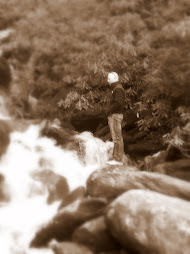This one woman, the only woman in all the world, she must belong to me, she must be mine. Let God keep Heaven, if I could keep her. I know what I choose; it is something so great that Heaven itself must be the loser by such a division, for what would be left to Heaven if I keep her? The faithful Mohammedans will be disappointed in their hopes when in their Paradise they embrace pale, weak shadows; for warm hearts they cannot find, all the warmth of the hear is concentrated in her breast; they will yield themselves to a comfortless despair when they find pale lips, dim eyes, a lifeless bosom, a limp pressure of the hand; for all the redness of the lips, and the fire of the eye, and all the restlessness of the bosom, and the promise of the hand, and the foreboding of the saigh, and the seal of the kiss, and the trembling of the touch, and the passion of the embrace - all, all are concentrated in her, and she lavishes on me a wealth sufficient for a whole world, both for time and eternity..."
Why is it that others can always say it better than me?
P.S. I really like pictures of famous dead people, especially if they're cool looking and it just so happens that Kierkegaard is, so that's the handsome man starring at you at the top of this post. In the future I will probably continue to add pictures of the cool people I am referencing.







